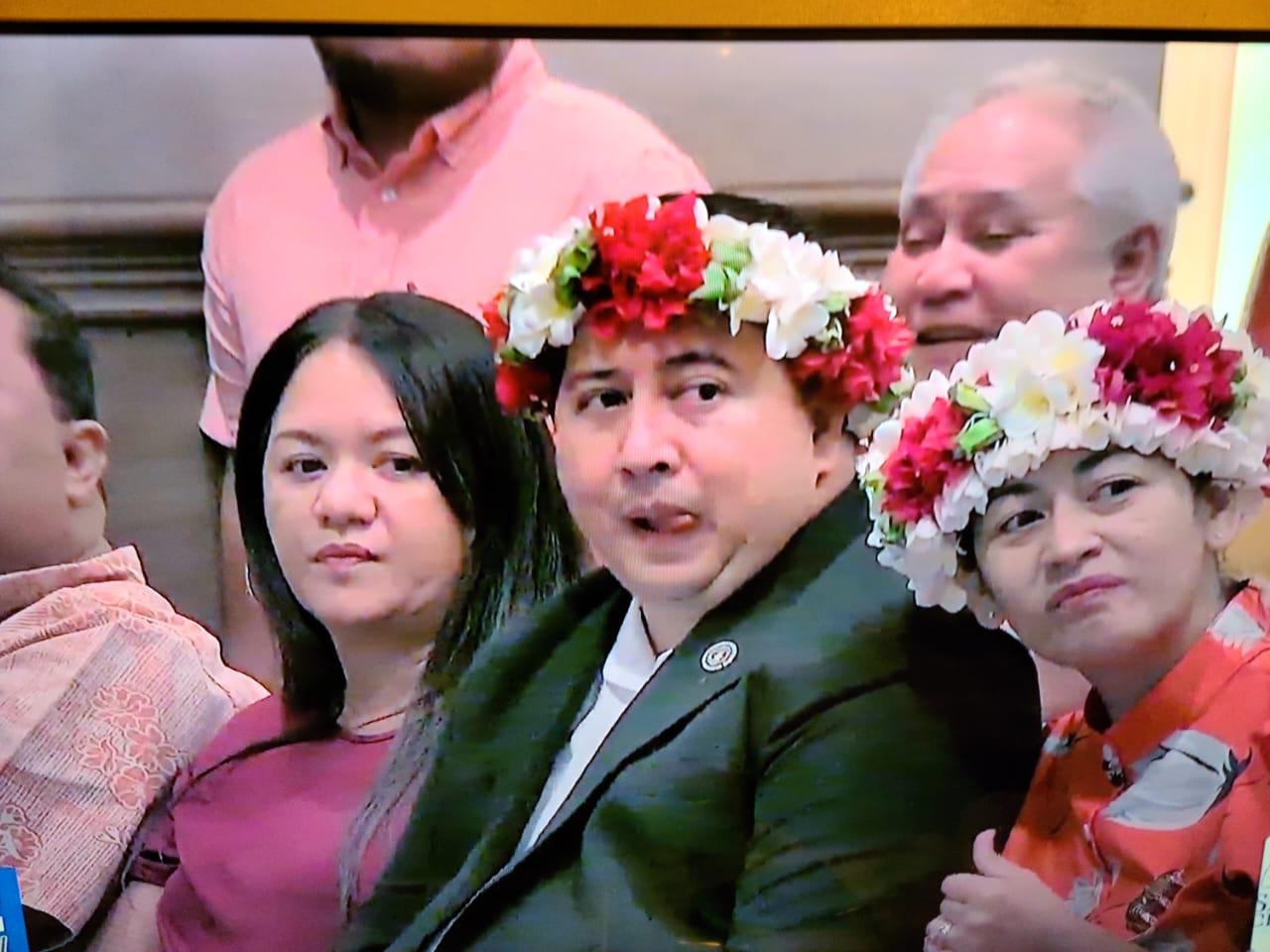Did the Torres administration use federal funds to buy votes? And were bankers complicit in the alleged conspiracy? These are questions the CNMI House of Representatives have for seven government officials and bankers, who have been issued subpoenas to appear before the House regarding their role in the so-called BOOST program.
Information about the program has been scarce, with two cabinet secretaries refusing to provide answers to a joint committee of the House investigating alleged abuses of federal funds for the program. That joint committee is a teaming up of the Judiciary and Government Operations Committee led by Rep. Celina Babauta, and the Ways and Means Committee led by Rep. Donald Manglona. Their query followed reports of Torres administration cronies receiving grants from the program, and officials giving out money in exchange for commitments to support Gov. Ralph Torres’s reelection, which he lost in a landslide defeat Friday.
Ms. Babauta and Mr. Manglona, who recently were elected to the CNMI Senate, penned letters to secretary of finance David Atalig, Jr., and to secretary of commerce Edward Deleon Guerrero more than two weeks ago requesting financial and program information about BOOST. Among their requests were the written protocols for the selection of recipients and payments of grants, and a list of the applicants approved to date. Neither responded to the request for documents.
The non-compliance with the request led the joint committee to issue subpoenas duces tecum, or commands for documents, to both secretaries for the information they originally requested. Subpoenas for documents also were sent to Wil Castro, a former Guam senator and currently Mr. Torres’s chief of staff.
Those documents were due to the joint committee yesterday. Mr. Castro, however, contacted Ms. Babauta and Mr. Manglona to apologize, and claimed a miscommunication kept him from complying with the subpoena, according to Ms. Babauta. The chairs granted Mr. Castro an extension to produce the documents, in the spirit of camaraderie, and understanding Torres administration officials still are reeling from their landslide defeat over the weekend to Lt. Gov. Arnold Palacios and Saipan Mayor David Apatang.
Since the joint committee vote to issue the subpoena duces tecum, members of the House have been inundated with tips from the public and from business owners. These tips indicate Torres administration officials, in the lead-up to the November 25 runoff election, had conspired to use the federally-funded program to issue as many grants as possible to democrats and independents in a futile attempt to have those voters switch allegiances to the republicans. This led to a unanimous vote of the joint committee to issue subpoenas testificandum, or commands for people to appear and to testify before the House, to:
- Secretary of Finance David Atalig, Jr.
- Secretary of Commerce Edward Deleon Guerrero
- Department of Commerce bureau director Jesus Taisague
- Governor’s chief of staff William Castro
- Bank of Saipan president John Arroyo
- Bank of Saipan employee and BOOST program administrator Karen Callen
- Bank of Guam vice president Marcy Tomokane
The government officials and bankers have not yet been served their subpoenas testificandum. They will be commanded to appear on December 16. Merry Christmas.
_____
The following is a statement committee member Rep. Tina Sablan made on the House floor immediately prior to the vote on the subpoenas duces tecum:
 The Secretary of Finance was quoted in the papers saying there is “nothing to hide” in the BOOST program. We have certainly heard that line before, many times, from none other than his boss, the governor himself.
The Secretary of Finance was quoted in the papers saying there is “nothing to hide” in the BOOST program. We have certainly heard that line before, many times, from none other than his boss, the governor himself.
Nothing to hide, and yet they hide. They hide so much.
The committees have asked for documents and information that should be 100% public records, and should be 100% actually available to the public.
Why? Because these are 100% public funds, being handed out through a program overseen by government officials.
Governor Torres likes to throw that 100% figure around. I do too. And when it comes to public funds, we should expect timely, 100% compliance with our requests for information.
The committees have sought really basic information that both Finance Secretary Atalig and Commerce Secretary Deleon Guerrero should be able to provide right away, 100%. Who is administering the program? What is the source of funding? Who has been approved for funding, and in what amounts? Who has not been approved?
There are other questions, too, that the officials in charge of this program should be able to answer, immediately, with 100% transparency – especially since the program is already rolling out and checks are already being issued.
Where are the program guidelines? They’re nowhere on the website, so where are they? Certainly nothing was published for public review and comment before the governor rolled out this program. I suspect they don’t exist. Because if they did exist – why not publish them?
All that one can find on the BOOST website are vague, short blurbs. Apparently all one has to do to apply for a BOOST business grant is write a letter, attach a business plan and profile, and a list of products and services. If you’re a subsistence farmer, fisherman, or rancher, all you have to do, apparently, is take a photo and fill out a simple one-pager declaring that you are a farmer, fisherman, or rancher, and boom – you get your $500 boost.
The website does say that applications will be processed “subject to availability of funds, and that the “program may terminate without notice.” Which doesn’t exactly boost confidence in the integrity of this program. And which brings me to this point: we don’t even know how much money is available. Those numbers keep changing. Why is there no consistency – 0% consistency – between the amount announced by the federal government and the amounts that CNMI officials are touting?
Also, what is the cap on the amount of money that can be awarded? The website says there are limits, but they’re for “internal guidance” and “not publicly available so not to encourage applicants to apply for the full amount.” That doesn’t even make sense. Since when does a taxpayer-funded business grant or loan program not publish the maximum amount that a qualified applicant may apply for? A simple Google search will show that announcing the caps on such awards is pretty standard.
Nothing to hide they say – so why hide that? Maybe to encourage certain people who would be in the know to apply for the max. Or maybe it’s a moving target, and they’re flying by the seat of their pants. Who knows? Only Governor Torres and a small inner circle of people know.
Moreover – why has the deadline been extended three times? And why was there such a short application period for the farming, fishing, and ranching grants? They announced it last week, and the deadline was Friday – hence the 100% awful lines out the door at the bank and the 100% pandemonium that was created at the business licensing office last week.
Why did the deadline have to be Friday? How much planning actually went into this?
Other questions: What contracts have been awarded to run this program, not just for administration, but also for marketing, and for all the mixers, the parties, the concerts, the food and alcohol? Has anyone advised the governor’s office that federal funds can’t be used to buy alcohol?
And finally, some of the most basic questions of all: What is the process for reviewing applications? Who sits on that review panel? How were they were selected or appointed? What criteria are they using? Is there even a rubric for review? My understanding is no. And who has the final say?
Governor Torres has been quoted in the media saying that he has no involvement in deciding who gets BOOST grants. Yet, we have records that show otherwise: correspondence – “internal guidance” one might say – that clearly indicate that the person who makes the final decisions on BOOST awards is, in fact, the governor himself.
If there is nothing to hide, then every single person we summon to the legislature should be prepared to answer 100% of our questions with 100% truthfulness, and submit 100% of the records we ask for. And the people of the commonwealth have every right to expect 100% fairness and transparency in the administration of this program, and the distribution of public funds.




